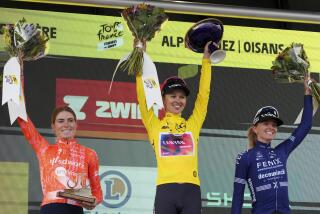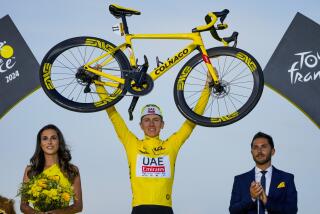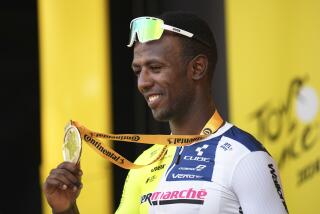Pantani Is Winner of Tour de France
- Share via
PARIS — On an afternoon fittingly darkened by rainclouds and a downpour, the Tour de France finally crossed the finish line Sunday, bringing to a close the most sordid and controversial year in the classic bicycle race’s history.
Sullied by ongoing French police investigations into the use of performance-enhancing drugs by riders, the Tour, and professional cycling in general, now must face the immediate and immense challenge of cleaning up its act and image.
“You can’t do 35,000 kilometers [21,700 miles] a year just eating spaghetti,” Javier Mauleon, a member of Spain’s ONCE team, which withdrew en masse from the Tour last week, has said.
This year’s victor of the most prestigious contest in professional cycling was diminutive Marco Pantani of Italy, who won the Giro d’Italia in his own country earlier this season.
After a 21-day trip covering 2,400 miles, which ended on the celebrated Avenue des Champs Elysees of Paris, the 28-year-old Italian hill climber nicknamed “The Pirate” for the bandanna he wears atop his bald head, clocked an overall time 3 minutes 21 seconds ahead of defending champion Jan Ullrich of Germany.
The 5-foot-6, 123-pound Pantani, who took the lead from Ullrich last Monday after the German lost nine minutes in one day, became the first Italian to win the Tour since Felice Gimondi 33 years ago.
In third place overall was American Bobby Julich, who finished 4:08 off the winning pace and was one of the few nice surprises in this year’s Tour. Julich, 26, of Glenwood Springs, Colo., who rode with the French Cofidis team, said his goal next year will be to become the first American champion since three-time Tour laureate Greg LeMond in 1990.
But exactly what the next Tour will look like will become known only in months to come. Festina, the top-rated team in this edition, was expelled after its coach acknowledged that the taking of performance-enhancing drugs was an organized affair on his squad. Six of the remaining 20 teams dropped out.
The pack, 189 when the race began in Dublin, Ireland, on July 12, was nearly cut in half. As the race looped through France, from Britanny to the Pyrenees and then the Alps, seven people came within a single procedural step of being formally charged for illegal use of drugs during the Tour. They include one rider, Rodolfo Massi of Italy, who had been wearing the polka-dotted jersey as the contest’s leading mountain climber.
Stopped only by two world wars, the Tour, which began in 1903, almost ground to a halt Thursday when riders organized a go-slow protest to manifest their displeasure over how French police had interrogated and treated members of a Dutch team suspected of using drugs.
The International Cycling Union, the organization that governs the sport, has announced it will meet soon to draw the lessons of the 1998 Tour. On a broader front, the International Olympic Committee’s executive commission has been summoned to the IOC’s Lausanne, Switzerland, headquarters Aug. 20 with a single item on the agenda: how to combat “doping” in sports.
Meanwhile, the French government has announced creation of a group to tackle the problem, and a bill on fighting the use of drugs in sports is supposed to be scrutinized by lawmakers by mid-November.
“Loaded up, cyclists have always been,” Eddy Merckx, the Belgian great who won the Tour five times, once said. “And in the laboratories, they are always one product ahead of the rules.”
However, the Tour de France, a private business that grosses more than $41 million a year, seemed to many observers to take the problem seriously only when customs, police and prosecutors got involved this year. On July 8, French customs agents discovered 400 vials, capsules and pills of illegal performance-boosting drugs in a car belonging to a masseur on the Festina team. In March, two mechanics from another team, TVM of the Netherlands, were arrested carrying more than 100 doses of a chemical that boosts an athlete’s endurance by stimulating the production of red blood cells.
“There are donkeys who want to become racehorses,” said Bernard Hinault of France, another five-time Tour winner. The 21st and final leg of the Tour, from Melun southeast of Paris to the Right Bank of the French capital, was 91.45 miles long. The best time was clocked by Belgian sprinter Tom Steels, giving him his fourth stage victory.
As the cyclists began their 10 laps on the Champs Elysees, the windup to the race, a heavy rain began to fall, making the cobblestones dangerously slick. In the final minutes, the clouds broke, and sunshine poured through. Julich, overjoyed at becoming the first American since LeMond to make the top three, said Sunday’s weather had been like the scandal-marred Tour as a whole: “Good, not so good, finally very good.”
(BEGIN TEXT OF INFOBOX / INFOGRAPHIC)
World Winners
A list of the number of winners of the Tour de France by country:
France: 37
Belgium: 17
Italy: 9
Spain: 8
Luxembourg: 4
United States: 3
Switzerland: 2
Netherlands: 2
Three tied: 1
*
Complete results C13
More to Read
Go beyond the scoreboard
Get the latest on L.A.'s teams in the daily Sports Report newsletter.
You may occasionally receive promotional content from the Los Angeles Times.










